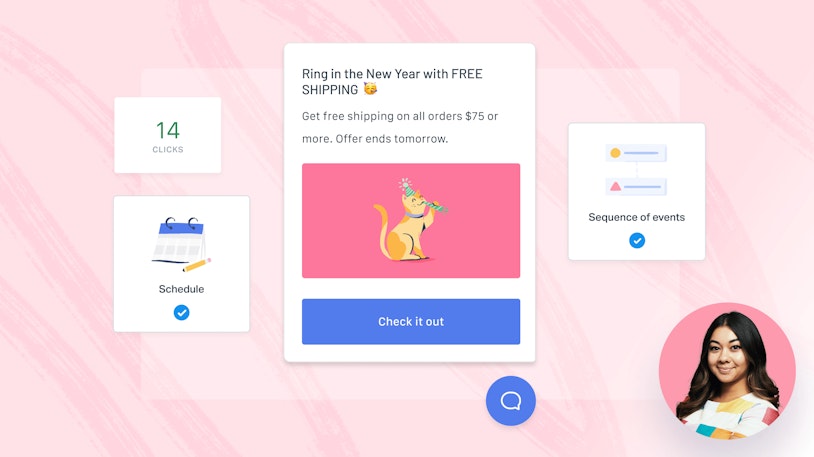The world of sales and marketing is constantly evolving, particularly in the online space, so optimizing lead conversion and improving customer retention are critical factors for business growth. One way to achieve these goals is through the effective implementation of customer relationship management (CRM) systems.
In this guide, we'll explore the essentials of CRM marketing, its benefits, and the top CRM tools available in the market. We'll also get into strategies, tips, best practices, and common challenges faced in CRM implementation so you walk away with the knowledge necessary to better manage customer interactions and fuel growth.
What is CRM marketing?
CRM marketing is a blend of strategies and tools used to manage interactions with leads and customers. This approach to marketing involves capturing, storing, and analyzing customer data to understand their needs, preferences, and behaviors. Through this, you can personalize your offers, tailor your communication, increase customer satisfaction, and ultimately deliver a better customer experience.
While traditionally the term was associated with the use of software tools to organize contact details, it has evolved significantly. CRM in marketing is no longer just about managing contact information — it's also about the whole journey of a customer with a business, from attraction through conversion and beyond.
Benefits of CRM marketing
Integrating CRM into marketing practices provides both strategic and tactical benefits that significantly contribute to business growth. Below are a few of those benefits:
Detailed customer insights: CRM systems enable your team to gather and organize data from various customer interactions, providing valuable insights into customer behaviors, preferences, and needs so you can tailor your offers and increase customer satisfaction and loyalty.
Improved customer segmentation: CRM solutions allow for precise customer segmentation that enables targeted marketing campaigns, resulting in improved response rates and return on marketing investment.
Enhanced communication: CRM tools provide a centralized platform for storing customer-related information, allowing for consistent communication across different departments within your business.
Increased efficiency: By automating routine tasks such as contact management, email marketing, and follow-ups, CRM systems allow your marketing team to focus more on strategic tasks, improving overall productivity and efficiency.
Fosters customer retention: Through a CRM, you can gain a better understanding of customer needs and anticipate issues before they arise, leading to improved customer service experiences and increased customer retention rates.
Facilitates measurement and evaluation: Most CRM systems offer reporting and analytics features, allowing you to track the effectiveness of your marketing campaigns, monitor key performance indicators (KPIs), and adjust your strategies based on real-time data.
Types of CRM marketing
Choosing the right CRM system for your marketing efforts is important for optimizing your customer management strategy. To help you make an informed decision, let's explore the three primary types of CRM marketing systems: analytical, collaborative, and operational. Understanding the differences between these systems and their key features will enable you to determine which type is best suited to meet your business's unique needs and objectives.
Analytical CRM
Analytical CRMs revolve around gathering customer data and analyzing it to drive decision-making. These systems focus on delivering a 360-degree customer view, allowing for intelligent business forecasting and strategy development.
The power of analytical CRM lies in its ability to convert raw data into insightful information, enabling you to understand your customers better and shape your strategies for achieving customer loyalty and satisfaction.
The main features of an analytical CRM include:
Information gathering and data mining.
Customer segmentation.
Predictive modeling.
Collaborative CRM
The primary goal of a collaborative CRM is to enhance communication and collaboration among the various departments within your business, as well as with external partners such as suppliers, distributors, and retailers. This approach helps to streamline the flow of customer-related information across different touchpoints, resulting in more consistent and efficient customer interactions.
By leveraging a collaborative CRM, you can optimize your customer journey and ensure that all team members involved are working toward a common goal of enhancing customer satisfaction.
Key features of a collaborative CRM include:
Knowledge sharing tools.
Real-time data synchronization.
Multi-channel integration.
Operational CRM
An operational CRM is designed to automate and optimize daily marketing, sales, and customer service processes. This type of CRM focuses on streamlining business operations, improving efficiency, and enhancing customer interactions by automating routine tasks and providing insight into customer behavior.
Investing in an operational CRM allows you to concentrate on building customer relationships and delivering value without the burden of time-consuming, repetitive manual tasks.
Key features of an operational CRM include:
Sales automation.
Marketing automation.
Customer service management.
Types of CRM marketing tools
Many CRM marketing tools are multitaskers, blending operational and analytical CRM features. This means you get streamlined operations along with valuable data insights, all from one tool. Let's examine how these tools function in key business sectors like email marketing, marketing automation, and customer service.
CRM email marketing
Email remains a key player in marketing for its ability to provide targeted, personalized communication with customers and prospects. CRM email marketing refers to the use of a CRM system to create and manage email marketing campaigns.
Within a CRM, email marketing is not a one-way communication street. It's an ongoing conversation that aims to build and nurture relationships with customers by delivering relevant and personalized content.
So how exactly does a CRM support email marketing, and how does this drive leads and sales? Here's a closer look.
Personalization
CRM systems store numerous details about customers, including their purchase history, preferences, and interactions with your business. This data allows the creation of highly personalized emails, contributing to better engagement rates. By tailoring content to individual preferences and behaviors, you can better connect with your audience, increasing both click-through and conversion rates.
Segmentation
The extensive data gathered by CRM systems allows you to segment customers into specific groups based on a variety of factors such as demographics, buying behavior, or engagement level. Segmentation enables the creation of targeted email campaigns, increasing relevancy and improving response rates.
Automation
A significant advantage of CRM email marketing is the opportunity for automation. Automated email campaigns can be created to trigger based on specific customer actions or stages in the sales cycle. This ensures timely and appropriate communication with customers, aiding in managing and nurturing leads effectively and ultimately driving sales.
Tracking and analysis
Many CRM systems provide tracking tools to monitor the effectiveness of email campaigns, allowing you to assess key metrics such as open rates, click-through rates, and conversion rates, providing valuable insights into what strategies work well and where improvements can be made.
CRM marketing automation
Capitalizing on CRM tools to automate marketing tasks is a powerful way to streamline your business operations, enhance efficiency, and free up valuable time. CRM-based marketing automation enables you to:
Schedule and send communications: You can schedule emails or in-app messages, pick the appropriate templates, and send them to targeted customer segments at the perfect time, all without babysitting the process.
Customer segmentation: CRM tools streamline the process of segmenting your customers based on their demographics, purchase history, or behavior.
Track customer behavior: CRM tools keep an eye on customer behaviors, interactions, preferences, and purchases, and they can provide valuable insights that inform your marketing strategies, ensuring that you hit the mark each time.
CRM marketing automation is about working smarter, not harder, increasing productivity without sacrificing personal touch in your customer engagement.
CRM for customer service
A CRM system can transform your customer service from reactive problem-solving to proactive relationship-building. It brings structure to the important (yet sometimes chaotic) realm of customer service and opens up new avenues of customer satisfaction and loyalty.
Here are a few ways CRM marketing tools for customer service enable you to manage, streamline, and improve every customer interaction:
Immediate problem-solving
CRM systems diligently record and track every customer query, enabling your customer service team to prioritize and address issues efficiently. This means your team can accommodate customer needs quickly, facilitating a sense of satisfaction.
Tailored assistance
CRM marketing tools put all relevant customer information right at your team’s fingertips, including past interactions and specific customer preferences. This information aids in providing personalized assistance to every customer, fostering a connection that promotes customer loyalty.
Team performance evaluation
Beyond facilitating customer relationships, a CRM system can be an integral tool for assessing the performance of your customer service team by pinpointing areas that need refinement and highlighting successful strategies.
The 4 best CRM marketing tools
Here are 4 CRM marketing tools that provide exceptional value and functionality.
Help Scout
Zoho CRM
monday.com
ActiveCampaign
1. Help Scout
Best CRM marketing tool for customer-centric communications.
Help Scout isn't your typical CRM. It's a customer communication platform that enables you to nurture customer relationships and facilitate comprehensive communication. This robust platform offers a suite of tools that go beyond basic CRM functionalities, allowing your business to interact with your customers across numerous touchpoints.
Help Scout enables you to view a snapshot of all conversations you've had with a specific customer, fostering a context-rich interaction each time. Beyond this, adding contact information to a customer profile means your team can track vital details such as where someone works and their job title, contributing to a more personalized service.
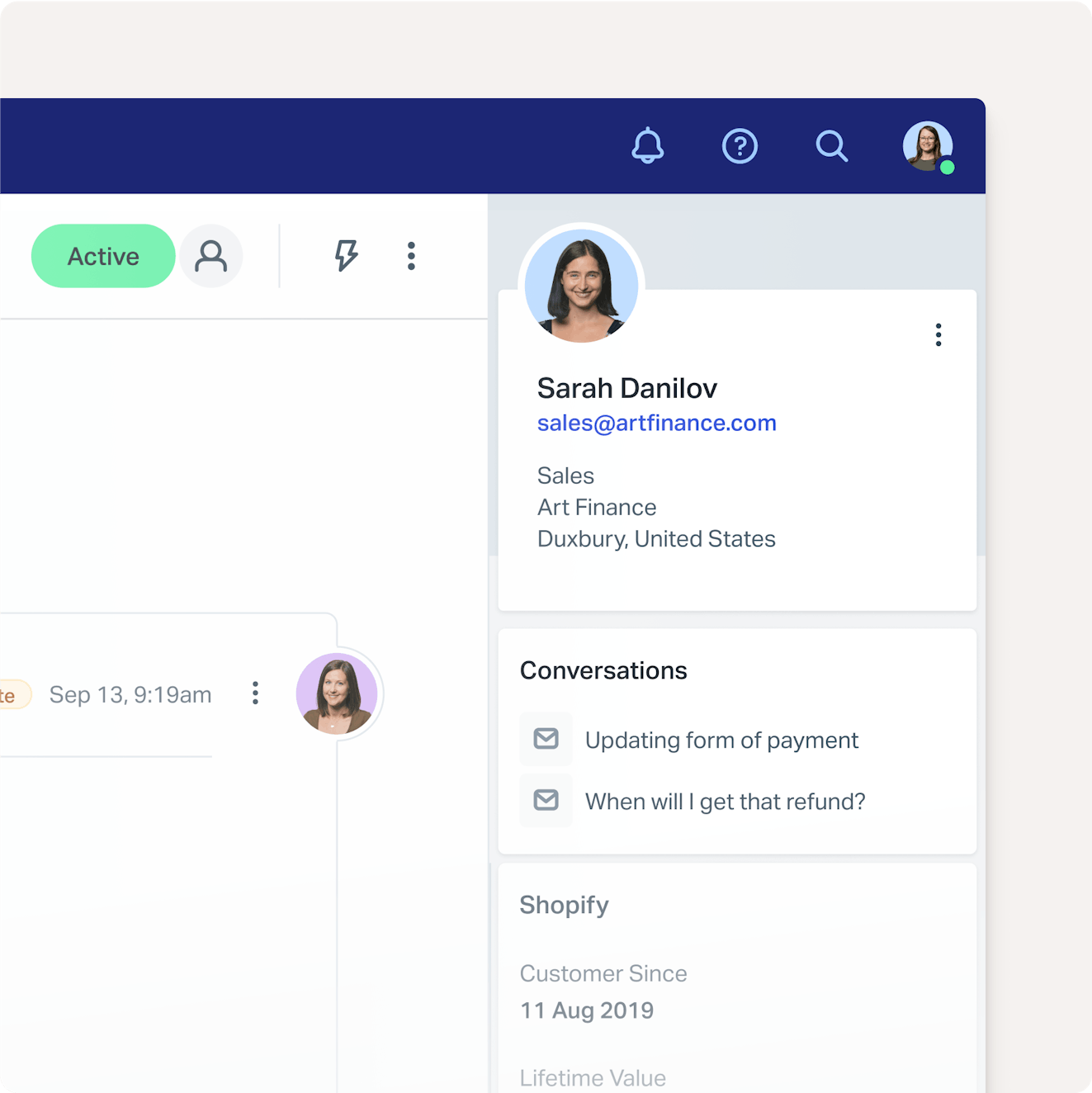
Help Scout boasts a range of powerful features to keep you connected to your customers. Notable among them is the shared inbox, a tool that centralizes customer communication and enhances team collaboration. It consolidates all your customer interactions into a single view, enabling your team to easily pick up where a colleague left off.
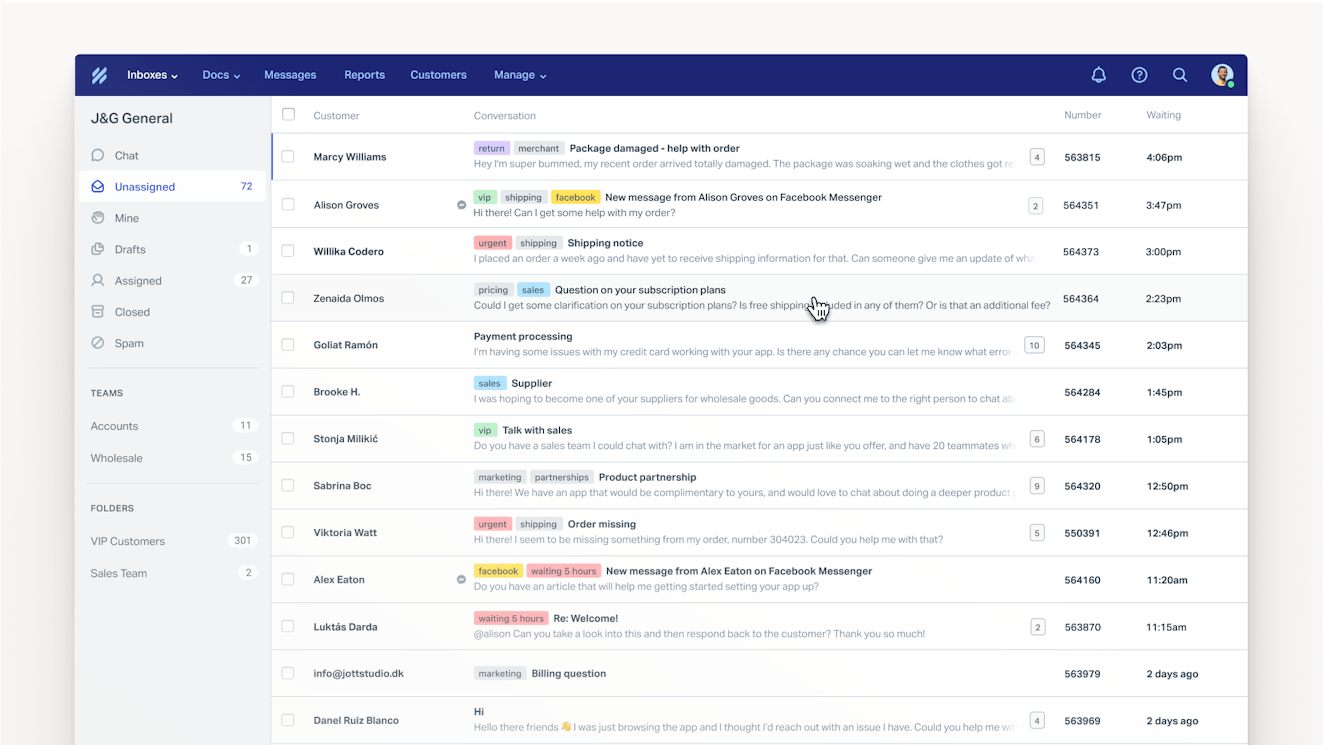
The platform offers live chat capabilities, bringing real-time interaction closer to your customers and enhancing their overall experience. Additionally, a built-in knowledge base creator further enriches your CRM efforts, ensuring that customers have ready access to essential information.
The platform also strengthens your operations with the aid of AI capabilities. With AI summarize, you can create a bullet point summary of long email threads in seconds while AI assist acts as a personal writing assistant to make your responses faster (and better).
Help Scout allows you to interact with your customers from a variety of places, making it possible to forge stronger connections and better relationships. This holistic, human-centric approach makes Help Scout an ideal tool for businesses striving to deliver exceptional customer experiences and communicate effectively with prospects.
Price: Free trial available. Plans start at $20/user per month.
Learn more about Help Scout:
2. Zoho CRM
Best CRM marketing tool for all-around business automation.
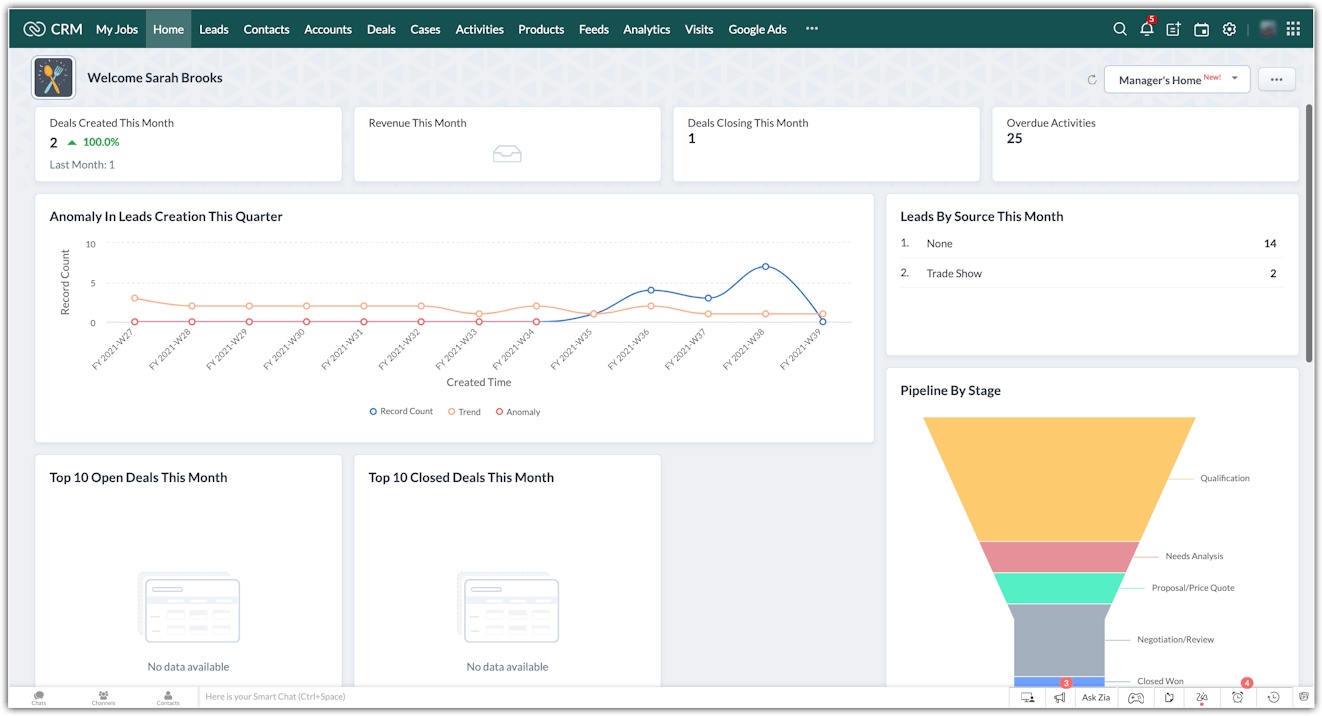
Zoho CRM is an all-in-one CRM platform favored for its automation features. It caters to businesses of all sizes and from various industries, with a focus on sales automation, customization, integration, and collaboration.
The platform provides several features that make it an integrated, adaptable solution. At the core of its offering is automation of the tasks in your sales cycle, allowing your team to focus on converting leads and closing deals faster. Furthermore, Zoho CRM's various automation capabilities, such as workflow automation, assignment rules, and escalation rules, enable you to streamline your processes and optimize team efficiency.
Price: Free trial available. Plans start at $14/user per month.
3. monday.com
Best CRM marketing tool for customizable business operations.
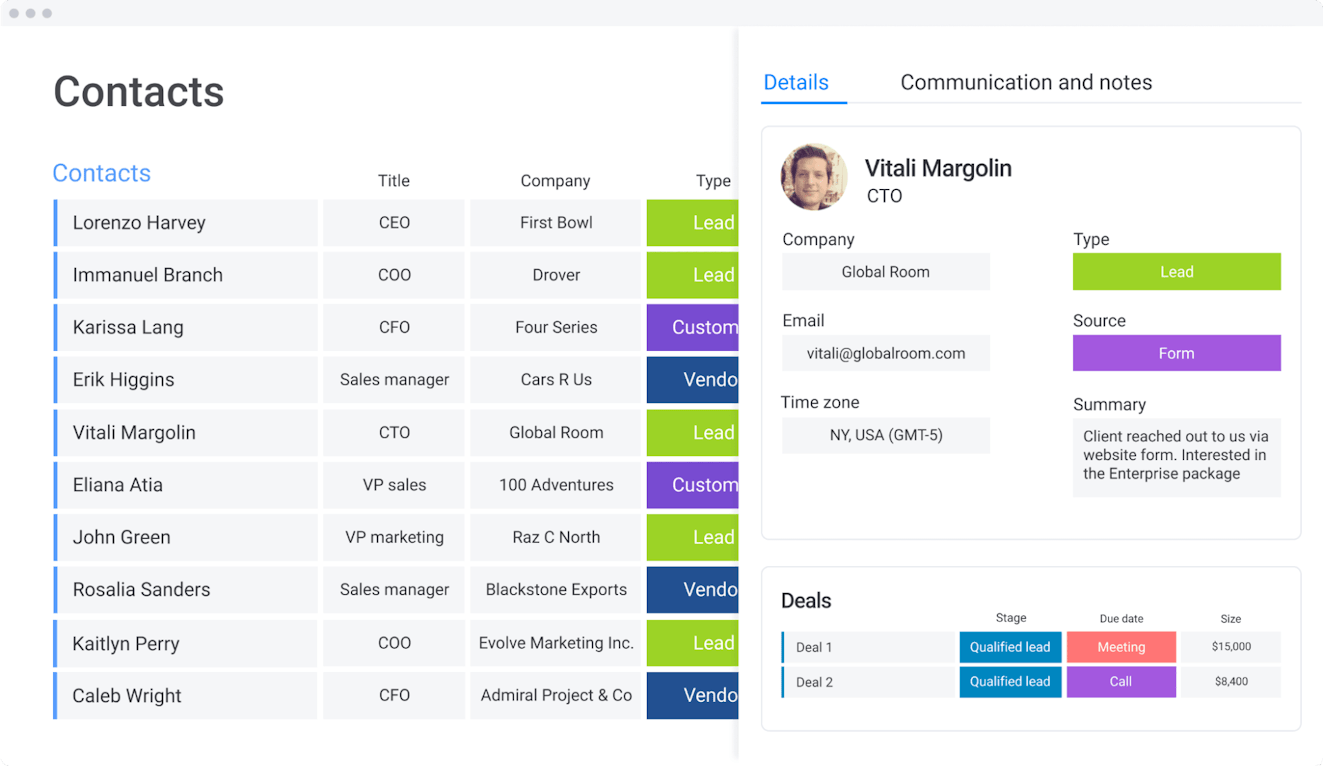
With its easily tailored approach, you can optimize monday.com to reflect your business’s unique operations, from managing multiple sales pipelines to modifying deal stages. This gives you freedom to structure your CRM without the need for complex coding or development skills.
The platform is well known for its automation capabilities, offering the opportunity to automate sales processes so you can focus on closing deals and interacting with customers. Coupled with CRM features such as lead management, account access, and customizable dashboards, monday.com provides a CRM solution that can enhance productivity and streamline sales processes.
Price: Free trial available. Plans start at $10/user per month (minimum of 3 users).
4. ActiveCampaign
Best CRM marketing tool for automations and email marketing.
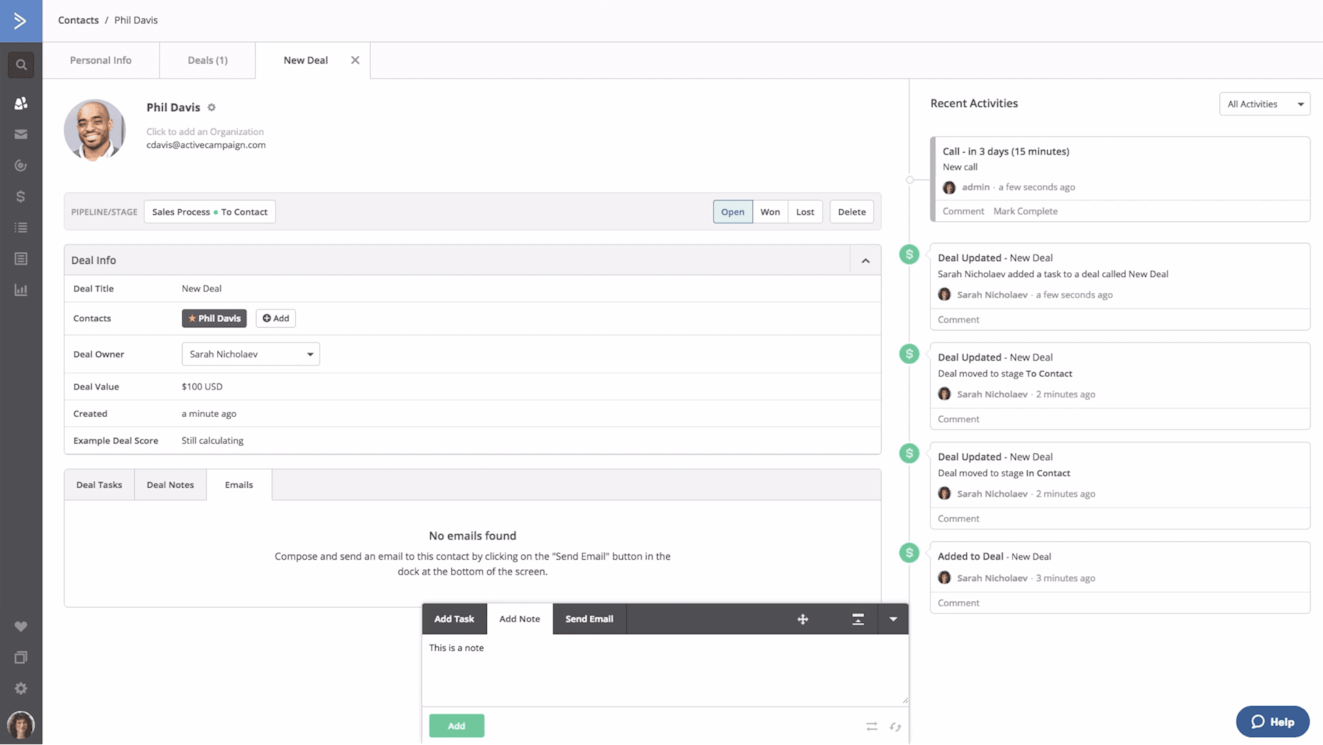
ActiveCampaign combines email marketing, marketing automation, sales, and CRM functionalities. The platform enables you to build behavior-based automated processes and provides segmentation options that allow for tailored messaging to specific audience groups.
This software also provides tools to monitor interactions with contacts, manage ongoing deals, and track business performance, while its reporting capabilities keep you informed on the effectiveness of your marketing strategies.
Price: Free trial available. Plans start at $29/user per month.
CRM marketing best practices, strategies, and tips
Now that you have a better idea of the tools available to help you with CRM marketing, here's a simple, approachable guide to help you establish and scale your CRM marketing strategy.
Establish clear CRM goals and objectives
Clear objectives should be your first step in implementing CRM marketing. This could range from improving customer retention to enhancing customer service or boosting sales productivity. By establishing these targets upfront, you'll have a clearer understanding of what CRM solution best aligns with your business.
Choose a CRM that suits your business needs
One size does not fit all when it comes to CRM tools. Whether your business needs are weighted toward customer service, sales, or marketing automation, your choice of CRM should be powerful enough to meet those needs. Sophisticated is good, but usability is king, so look for something that your team will be comfortable using.
Focus on integration
Your CRM software should integrate smoothly with other software and systems that your business uses, whether that's your email platform, marketing automation software, or sales data tools. Seamless integration allows data exchange and collaboration, enhancing overall productivity and operational efficiency.
Invest in training
Even the most intuitive and user-friendly CRM tool can have a learning curve. To maximize the benefits of your chosen CRM, invest in comprehensive staff training. Ensure that each team member understands how to use the tool confidently and appropriately, aligning with the specific needs and workflows of your business.
Understand the data migration process
Data migration to a new CRM tool can sometimes feel like transferring a handwritten novel into a digital document. It's a meticulous process that requires a lot of attention to detail. Before taking the plunge, make sure you analyze the variety, volume, and veracity of the data being transferred. This aids in maintaining data integrity and minimizes the risk of data loss.
Regularly update and optimize your CRM system
Like any technology, CRM systems should not be left stagnant. Regularly updating your system ensures that you take advantage of new features and improvements, keeping your business in step with technological advancements. Furthermore, regularly optimizing the system helps your team adapt to changes in business operations and customer behavior, ensuring your CRM remains a useful tool for your marketing strategy.
Common challenges of CRM marketing and how to overcome them
While CRM systems are designed to be a powerful force for streamlining operations and enhancing customer experiences, their implementation might come with a few stumbling blocks. Here, we shine a light on common challenges in CRM marketing and offer practical advice for overcoming them.
Overcoming resistance to change
Introducing a new CRM system can be met with opposition from some team members, particularly if it represents a significant shift in their daily workflow. The key to helping your team adapt lies in proper communication and support.
Solution:
Prepare your team by providing timely and clear information about the changes.
Invest in thorough training to help them feel confident and empowered with the new system.
Encourage feedback to understand potential concerns and address them proactively.
Ensuring data quality
Accurate and up-to-date data is essential for CRM adoption and success. Poor data quality can lead to misinformed decisions and a less-than-stellar customer experience.
Solution:
Establish guidelines and best practices for data entry.
Periodically audit the database to identify errors or gaps.
Allocate dedicated personnel to actively monitor the quality of the CRM data.
Integrating the CRM system with existing tools
A CRM platform may need to connect with various systems your business is already using. Poor integration might create inefficiencies or limit the CRM's overall effectiveness.
Solution:
Plan ahead and evaluate your existing tools to identify potential integration points.
Seek solutions (APIs, plugins, or third-party connectors) that provide seamless integration.
Consult with your IT department to ensure that any integration is smooth and secure.
Achieving meaningful user adoption
The success of a CRM system largely depends on user engagement. If your team isn't adopting the system, its potential benefits may never be fully realized.
Solution:
Involve team members in the CRM selection process to build buy-in from the start.
Present the CRM's value to each team member, highlighting what's in it for them.
Reward and recognize those who embrace the system, turning them into internal advocates.
Keeping up with system updates and maintenance
As with any technology solution, staying abreast of software updates and maintenance requirements is crucial to ensuring the CRM system remains a valuable tool in your arsenal.
Solution:
Designate a dedicated CRM administrator or team to handle updates and maintenance.
Regularly review release notes for updates, and communicate changes to users.
Establish periodic check-ins to gauge overall performance and identify areas for improvement.
Grow your business with CRM marketing
By now, you have a much better understanding of the benefits of CRM marketing and how it can substantially contribute to the growth of your business. Following best practices, addressing common challenges, and aligning your CRM strategy with your business objectives can have overwhelmingly positive results.
With so many options available in the CRM landscape, finding the solution that fits your needs can be tricky. Help Scout stands out as a great choice for those with a focus on customer service due to its robust feature set, customizability, and customer-centric approach.
Sign up for a free trial today and see the difference Help Scout can make for your business.







